June 26, 2022
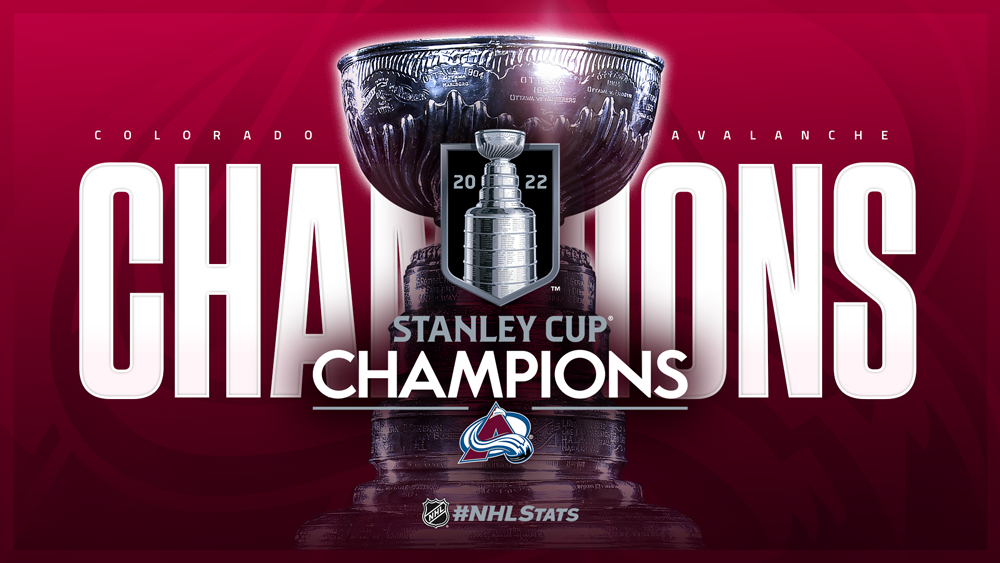
The Avalanche won Game 6 at AMALIE Arena to defeat the two-time defending-champion Lightning and win the Stanley Cup. Colorado captured its third championship in franchise history, following Cups in 1996 and 2001.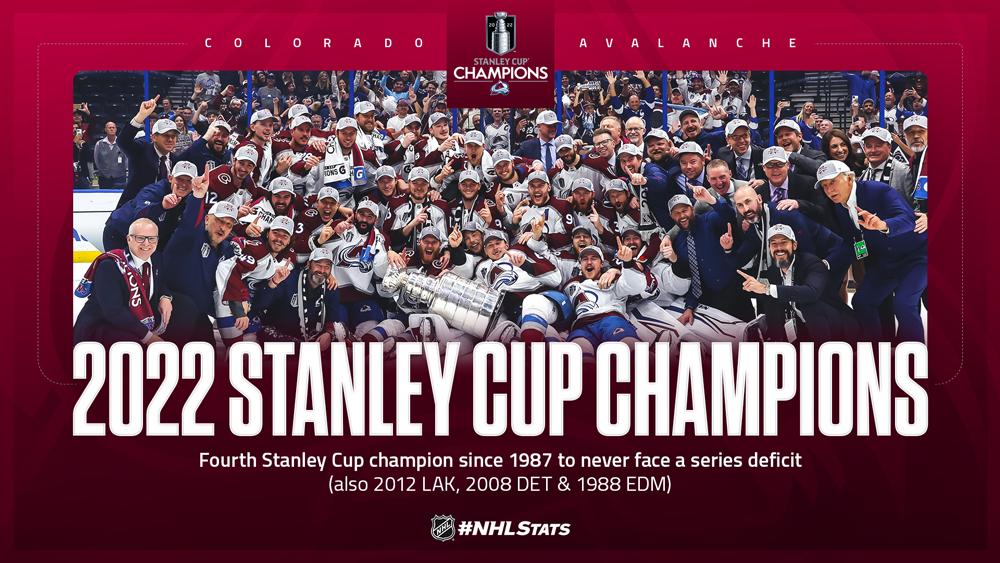
AVALANCHE SUMMIT STANLEY CUP PLAYOFFS WITH DOMINANT 16-4 RECORD
Colorado claimed its championship by going 16-4 in the 2022 Stanley Cup Playoffs, including sweeps in the First Round and Conference Finals as well as six-game wins in the Second Round and Final.
* The Avalanche became the sixth team to win a Cup with four or fewer postseason losses since 1987 when the best-of-seven format was adopted for all rounds. The only club among that group with fewer than four defeats are the 1988 Oilers, who went 16-2 plus their no-decision in the suspended game during the Final (which was tied 3-3 when called) en route to their fourth championship in five years.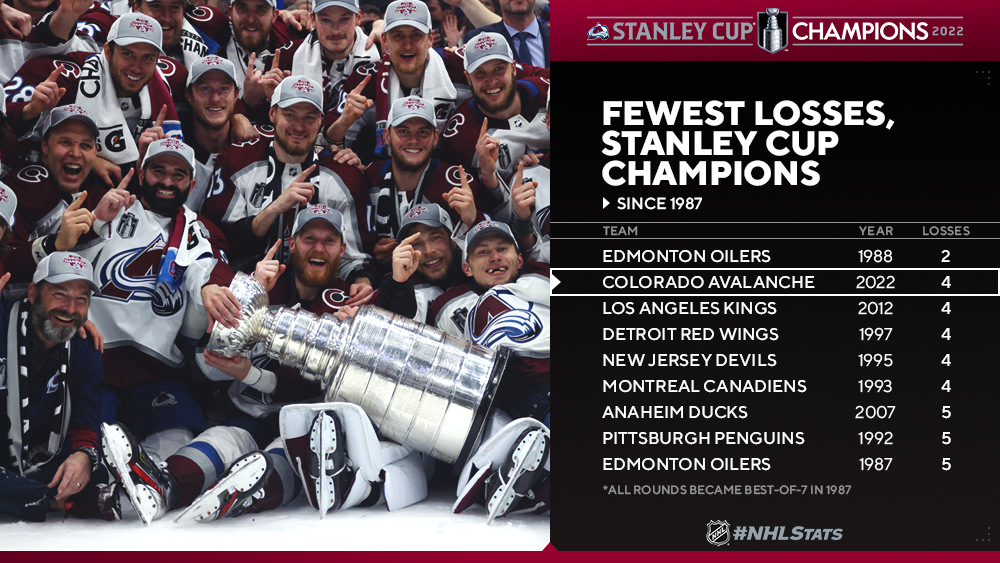
* Colorado held a multi-game lead in each of its four series this postseason. The Avalanche became the ninth team since 1987 with four multi-game series leads in a single playoff year, joining the 2020 Lightning, 2012 Kings, 2011 Canucks, 2008 Red Wings, 2003 Devils, 1995 Devils, 1988 Oilers and 1987 Oilers.
* Colorado’s journey featured two winning streaks of five or more games, including a franchise-record seven-game stretch. The Avalanche also concluded the postseason with a 9-1 record as visitors and became the third Stanley Cup champions since 1987 with one or fewer road losses, following the 2012 Kings (10-1) and 1995 Devils (10-1). The 2020 Lightning also went 10-1 in games where they were designated as the road team while playing in the neutral-site bubbles in Edmonton and Toronto.
COLORADO CLAIMS CUP FIVE YEARS AFTER LAST-PLACE FINISH
Colorado captured its championship five years after finishing last place in the League standings with only 48 points during the 2016-17 season (22-56-4) – among the 10 lowest point totals in an NHL season of 82 or more games. Avalanche veterans Mikko Rantanen, Nathan MacKinnon, Gabriel Landeskog, Erik Johnson and J.T. Compher all skated with Colorado during that campaign.
* It was the second time the franchise has won a Cup within five years of a last-place finish, as the Quebec Nordiques ranked 21st in 1990-91 before the Avalanche lifted the trophy in 1995-96 (their first season in Denver). Overall, it has happened five times in the expansion era (since 1967-68).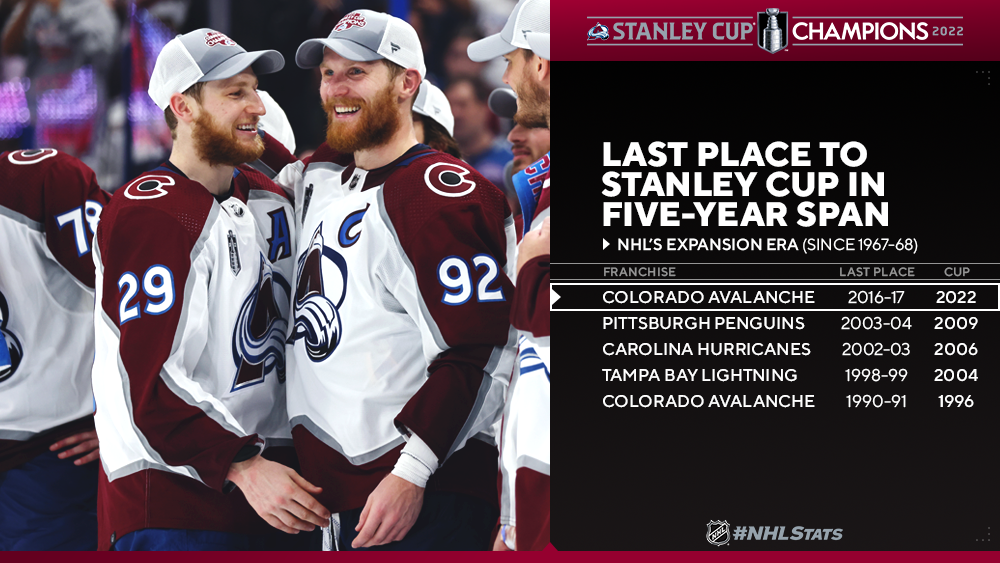
COLORADO CORNERSTONES SOLID THROUGHOUT POSTSEASON
Avalanche mainstays Mikko Rantanen (5-20—25), Nathan MacKinnon (13-11—24) and Gabriel Landeskog (11-11—22) combined for 29-42–71 during the 2022 Stanley Cup Playoffs, while 23-year-old defenseman Cale Makar (8-21—29) had a 29-point showing en route to adding a Cup and Conn Smythe Trophy to his NHL Awards collection which already includes the 2021-22 James Norris Memorial Trophy and 2019-20 Calder Memorial Trophy.
* Rantanen recorded eight of his 20 assists against the Lightning, which were one shy of the official NHL record in a Final shared by Daniel Briere with the 2010 Flyers, Larry Murphy with the 1991 Penguins, Wayne Gretzky with the 1987 Oilers and Jacques Lemaire with the 1973 Canadiens. Of note, Gretzky got 10 assists in the 1988 championship series including two in the suspended game on May 24 (a decision was made at the time to count player statistics as part of their career totals but not as part of official NHL records and, therefore, his official count for that series is eight).
* MacKinnon shared the NHL lead with 13 goals and became the third different player in franchise history with as many in a single postseason, joining Joe Sakic in 1996 and 2001 as well as Claude Lemieux in 1997. MacKinnon opened the playoffs with a four-game goal streak, had a hat trick in Game 5 of the Second Round and tallied five times from the Conference Finals onward (including four goals scored in tying or go-ahead fashion over that span).
* Landeskog had seven multi-point games over the course of the postseason, including three since Game 4 of the Conference Finals. His seven multi-point games trailed only Rantanen and Makar (both w/ 8) for the team lead.
* Makar became the fourth defenseman in NHL history with 29 points in a playoff year, joining Paul Coffey with the 1985 Oilers, Brian Leetch with the 1994 Rangers and Al MacInnis with the 1989 Flames. Makar and Rantanen established a franchise record for most assists in a playoff year, eclipsing the previous mark of 19 set by Peter Stastny with the 1985 Quebec Nordiques.
LANDESKOG JOINS OVECHKIN, CHARA AND COUNTRYMAN LIDSTROM ON RARE LIST
Gabriel Landeskog (Stockholm, Sweden), who set the tone in the Final just like Joe Sakic did during the team’s last trip to the round in 2001, became the fourth player in NHL history born and trained outside of North America to captain a Stanley Cup winner. He followed Alex Ovechkin (Moscow, Russia; 2018 WSH), Zdeno Chara (Trencin, Slovakia; 2011 BOS) and Nicklas Lidstrom (Vasteras, Sweden; 2008 DET).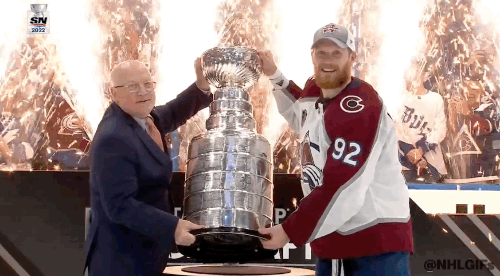
SAKIC SECURES FIRST STANLEY CUP AS GENERAL MANAGER, THIRD OF NHL CAREER
Joe Sakic, who captained Colorado to its Stanley Cup wins in 1996 and 2001, became the third individual in NHL history to win a championship as both a player and general manager with the same franchise. He joined Serge Savard of the Canadiens (player: 8; GM: 2) and Milt Schmidt of the Bruins (player: 2; GM: 2). In addition, Lester Patrick won the Cup as Rangers GM three times, including in 1928 when he also tended goal for the club under emergency circumstances in Game 2 of the Final.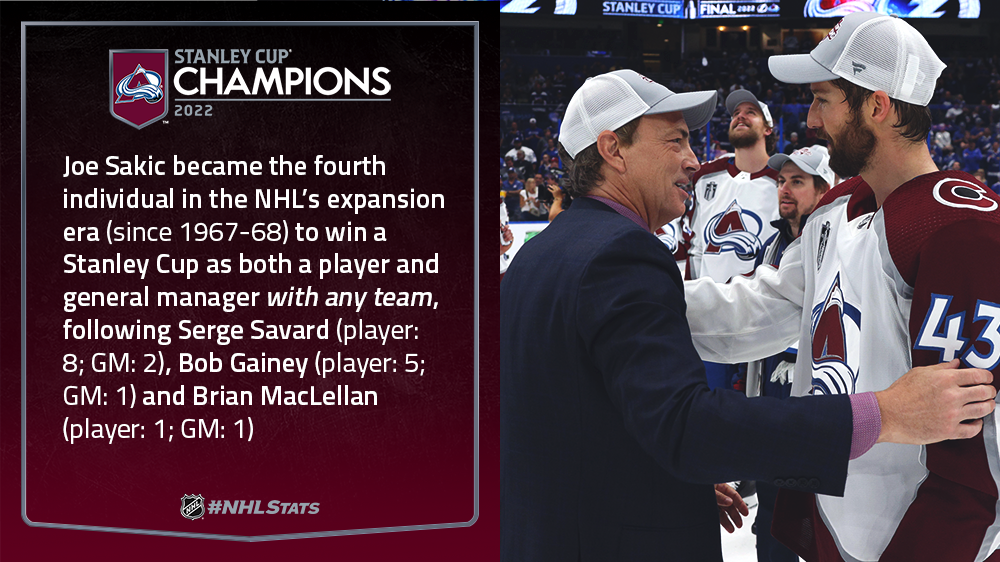
BEDNAR WINS STANLEY CUP AFTER CLAIMING CHAMPIONSHIPS IN AHL, ECHL
Jared Bednar won the first Stanley Cup of his NHL career and became the third head coach in franchise history to guide the Avalanche to a championship. Marc Crawford and Bob Hartley manned the Colorado bench in 1996 and 2001, respectively.
* Bednar, who won a Calder Cup with the Lake Erie Monsters in 2016 and a Kelly Cup with the South Carolina Stingrays in 2009, became the first individual with an NHL, AHL and ECHL championship as a head coach (since 1988-89 when the ECHL contested its inaugural season). Peter Laviolette nearly achieved the feat – he won a Stanley Cup with the Hurricanes in 2006 and a Calder Cup with the Providence Bruins in 1999 while also guiding the Wheeling Nailers to the Northern Conference Final during the 1998 Kelly Cup Playoffs, where they fell in six games to the eventual-champion Hampton Roads Admirals.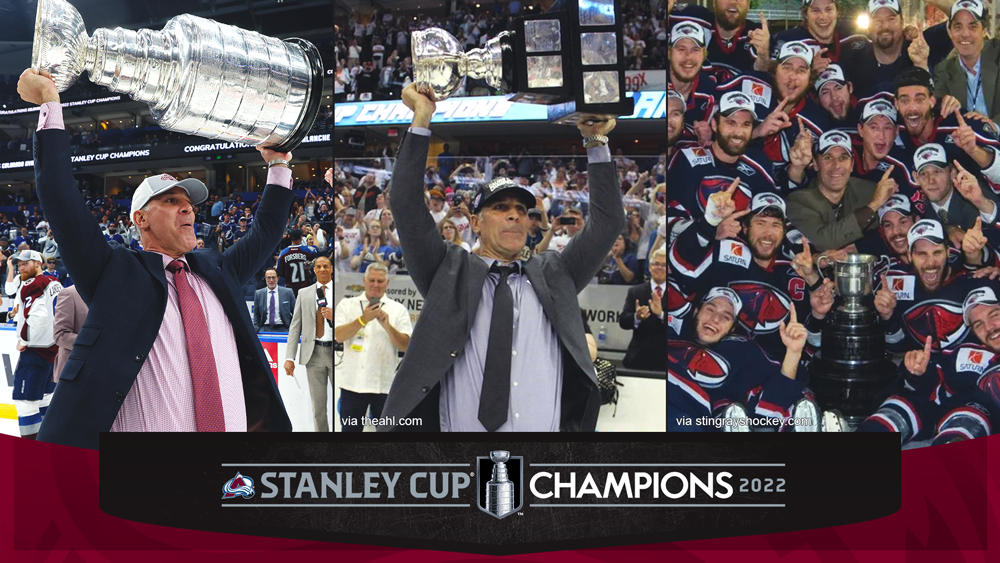
1,000-GAME VETERANS COGLIANO, JOHNSON JUBILATE AFTER FIRST STANLEY CUP WIN
Andrew Cogliano (1,140 GP) and recent graduate Jack Johnson(1,024 GP) became the 18th and 19th players in NHL history to win their first Stanley Cup after appearing in 1,000 career regular-season games. The list is topped by Ray Bourque (1,612 GP), who famously won the championship with the 2001 Avalanche at the end of his 22-season NHL career.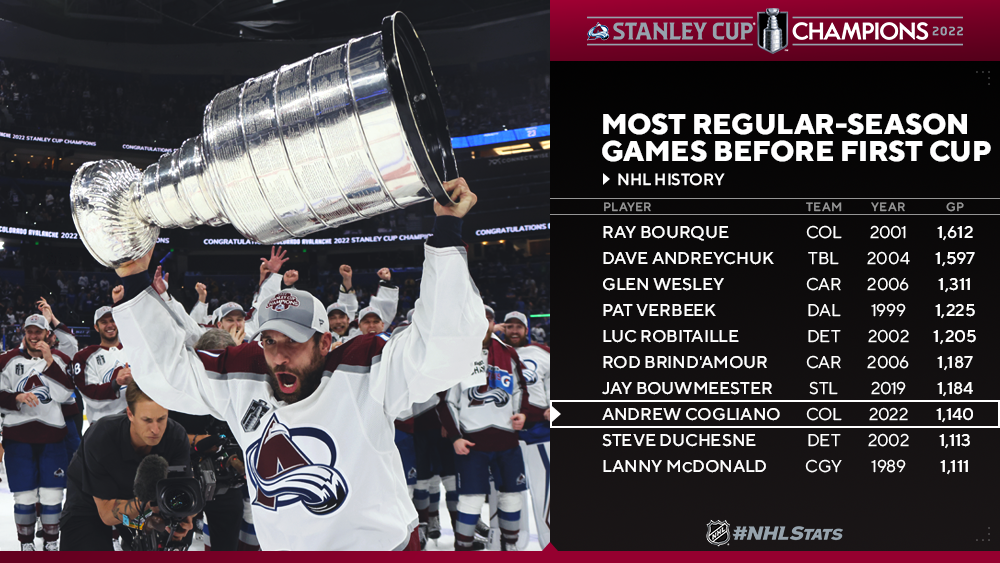
* Erik Johnson (857 GP; No. 1 in 2006) has the third-most career games played among current Avalanche players behind Cogliano and Johnson, while fellow top-two NHL Draft pick Gabriel Landeskog (738 GP; No. 2 in 2011) is the longest-tenured member of the franchise. Aside from them, only nine other top-two picks from the NHL Draft played at least 700 career games before winning their first Cup: Steven Stamkos (803 GP), Victor Hedman (762 GP), Alex Ovechkin (1,003 GP), Chris Pronger (868 GP), Mike Modano (710 GP), Brendan Shanahan (713 GP), Brian Bellows (835 GP), Kirk Muller (714 GP) and Rob Ramage (755 GP).
COMEBACK WINS ACCOUNTED FOR LION’S SHARE OF AVALANCHE VICTORIES
Ten of the Avalanche’s 16 wins this postseason were earned in come-from-behind fashion, including four third-period comeback victories and one where they rallied from a multi-goal deficit. Colorado’s 10 comeback wins tied the 2009 Penguins for the most in NHL history within a playoff year, while their four third-period comeback victories were one back of the League benchmark (held by the 2020 Stars, 2014 Kings, 1999 Stars & 1980 Islanders).
* While Colorado never trailed in a series, they did trail in all four of their series-clinching wins, becoming the first team in NHL history to do so.
* The Avalanche earned eight wins this postseason where they surrendered a lead, including two where they relinquished a multi-goal lead (Game 3 of R1 at NSH & Game 1 of SCF vs. TBL). Colorado trailed only the 1993 Canadiens (12), 1985 Oilers (9) and 1982 Islanders (9) for the most such wins by a Stanley Cup champion.
HELM, BURAKOVSKY WIN SECOND STANLEY CUP
Darren Helm (2008 DET) and Andre Burakovsky (2018 WSH) won their second Stanley Cup, with Colorado becoming the 12th champions in the NHL’s expansion era (since 1967-68) with two or fewer previous winners and fourth in the last five years (also 2020 TBL: Pat Maroon; 2019 STL: none; 2018 WSH: Brooks Orpik).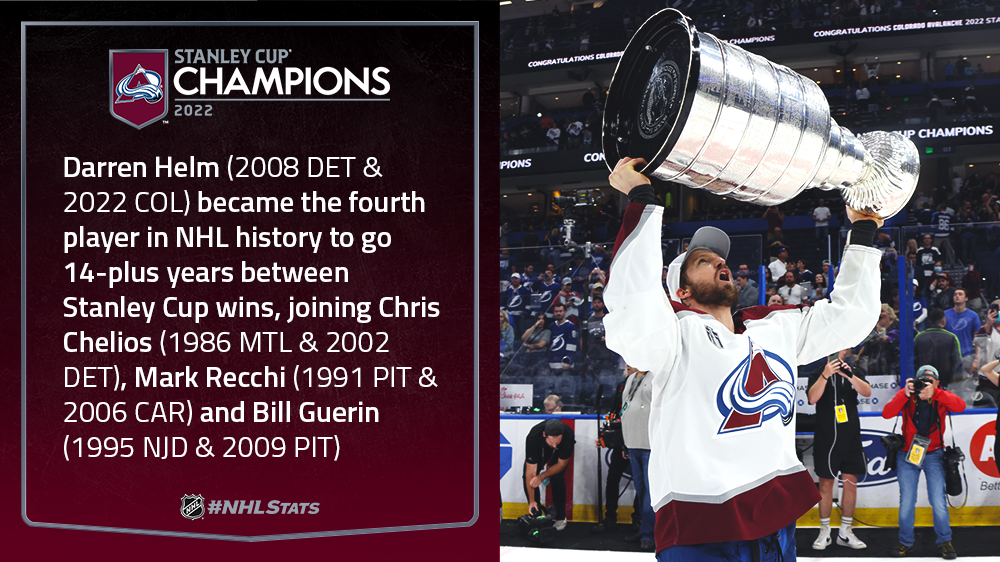
* Helm had two goals during the Avalanche’s championship run, none bigger than the series clincher with 5.6 seconds remaining in regulation during Game 6 of the Second Round. Helm (59:54) scored the second latest regulation-time series-clinching goal in NHL history, behind only the winner by Maple Leafs forward Nick Metz (59:55)in Game 6 of the 1942 Semifinals.
* Burakovsky opened the Final by burying the overtime winner early in Game 1. He became the second player in franchise history with an overtime goal in a Final contest following Uwe Krupp, who scored the Cup-clinching goal in the third overtime during Game 4 of the 1996 championship series.
POWER PLAY PROPELS COLORADO THROUGHOUT POSTSEASON
The Avalanche power-play scored at a 32.8% clip during their Cup run, the highest rate on record (since 1977-78) in one postseason by a team that played at least 20 games. Colorado went 20-for-61 with the man advantage, the fourth-most power-play goals in one postseason in franchise history.
* Colorado converted on 42.3% of their power-play opportunities on the road in the 2022 Stanley Cup Playoffs, the second-highest rate on record (also since 1977-78; min. 10 road GP). The 2019 Bruins edged them with a 44.1% success rate with the man advantage as visitors.
NO ROAD BLOCKS HALTING THIS CUP RUN
Colorado won nine of its 10 road games during the 2022 Stanley Cup Playoffs, including each of its first seven contests as visitors until a loss to Tampa Bay in Game 3 of the Final. Their nine road victories established a franchise record for one playoff year (previous: 8-3 in 1996, 8-2 in 1999) and finished one shy of the NHL record shared by six clubs.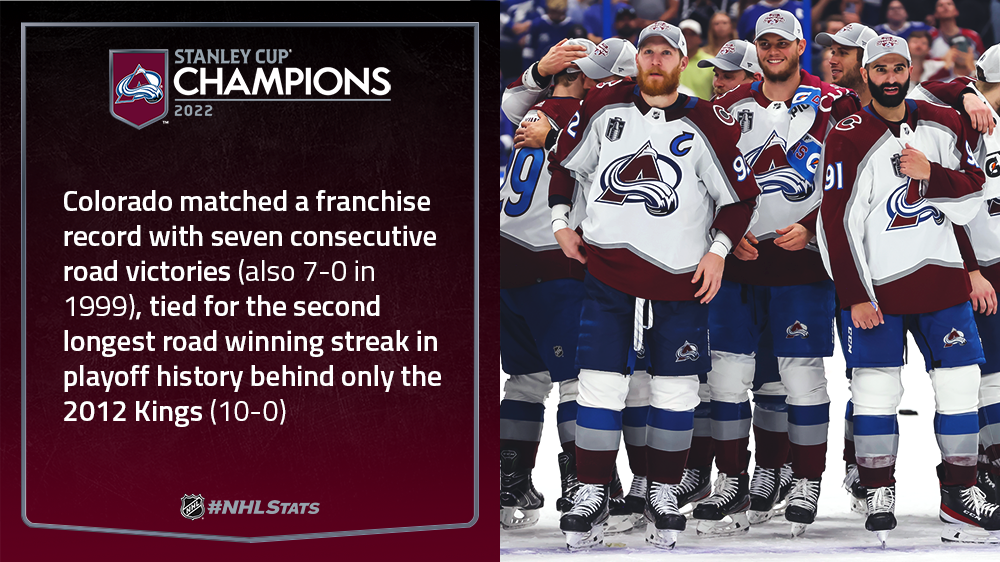
* The Avalanche also became the fourth Stanley Cup champions in NHL history to earn each of their four series-clinching wins on the road, joining the 2018 Capitals, 2009 Penguins and 2008 Red Wings.
ALL THE SMALL THINGS
Inspired by the tradition of nearly 18,000 fans singing Blink-182’s “All The Small Things” during the third period, a few more #NHLStats from Colorado’s Cup run:
* Artturi Lehkonen scored the Stanley Cup-winning goal Sunday on the heels of netting the series-clinching goal in overtime during Game 4 of the Conference Finals. He became the seventh player in NHL history with a series-clinching goal in the round before the Stanley Cup Final and in the Final during a single postseason, joining Alec Martinez with the 2014 Kings, Max Talbot with the 2009 Penguins, Bobby Smith with the 1986 Canadiens, Ken Linseman with the 1984 Oilers, Mike Bossy with the 1983 Islanders and Toe Blake with the 1946 Canadiens.
* Nazem Kadri had 7-8—15 in 16 games during the 2022 Stanley Cup Playoffs, including a hat trick in Game 4 of the Second Round, three points in a span of 2:04 in Game 2 of the Conference Finals as well as the overtime winner in Game 4 of the Stanley Cup Final during his return to the Avalanche lineup. He became the ninth player in NHL history to score an overtime goal in his Final debut (and first to do so outside of Game 1).
* Valeri Nichushkin notched nine goals during the 2022 Stanley Cup Playoffs after having just four tallies through the first 42 postseason games of his NHL career. He led all players with four goals in the Final, matching the franchise record for most in a championship series.
* Bowen Byram and Gabriel Landeskog concluded the postseason +15, sharing the best plus-minus in the NHL with Oilers captain Connor McDavid. Byram became the third rookie defenseman with a plus-minus of +15 or higher in a playoff year (since 1959-60 when the stat was officially tracked), joining Ken Morrow and Mike Busniuk.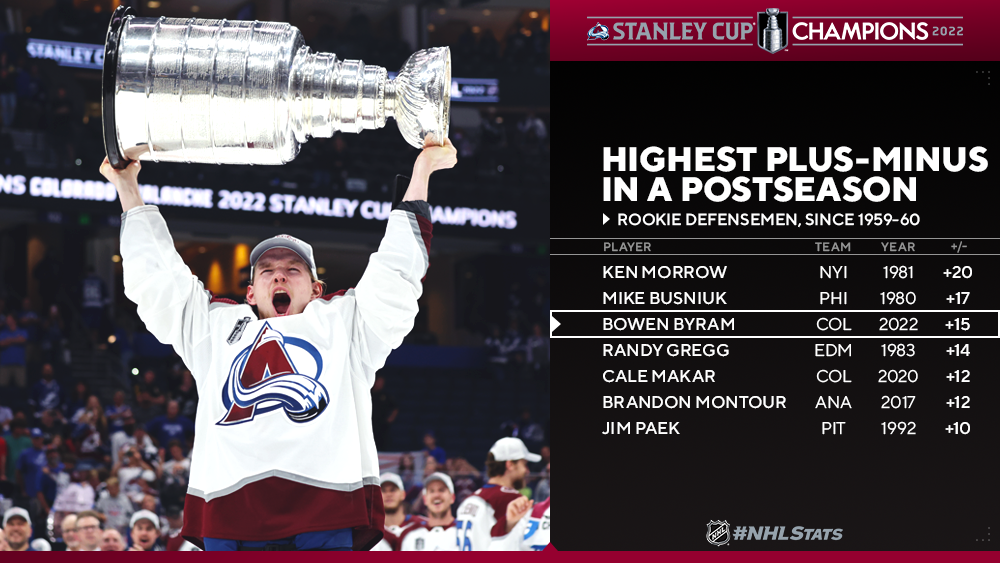
* Alex Newhook (St. John’s, N.L.) became the third Newfoundland-born Stanley Cup winner in NHL history, joining Daniel Cleary (2008 DET) and Michael Ryder (2011 BOS). Eight of the 10 Canadian provinces are represented among Avalanche players that won the championship, marking the highest such total by a Cup-winning team (previous: 7 by 2011 BOS, 1992 PIT, 1990 EDM & 1983 EDM).
* The Avalanche became the fourth team in NHL history to have multiple goaltenders each with six or more wins in a single postseason, following the 2017 Penguins (Marc-Andre Fleury: 9 & Matt Murray: 7), 2010 Flyers (Michael Leighton: 8 & Brian Boucher: 6) and 1972 Bruins (Gerry Cheevers: 6 & Eddie Johnston: 6). The Penguins and Bruins also won the Stanley Cup.
* The Avalanche became the fourth franchise in NHL history to win the Cup in each of its first three or more appearances in the championship series, following the Islanders (4: 1980, 1981, 1982 & 1983), original Ottawa Senators (4: 1920, 1921, 1923 & 1927) and Maple Leafs (3: 1918, 1922 & 1932).
* Not only did Colorado halt Tampa Bay’s bid for a three-peat, they emerged in a matchup against the two highest-scoring players in the postseason – sweeping the Oilers in the Western Conference Final despite Connor McDavid and Leon Draisaitl combining for 13 points in the four-game series.
* Colorado went 5-1 in overtime in six overtime games, tied with 2001 (3-3) for the second most such contests in one postseason in franchise history behind 1996 (5-2). Their five victories equaled a franchise benchmark set in 1996 with Uwe Krupp’s Cup-clinching goal.
* Colorado matched a franchise record for goals in a playoff game during their 8-6 victory in the opener of the Western Conference Final. That was tied for second-highest scoring game in Conference Finals history.
* Ten Avalanche players had at least one game-winning goal this postseason, which ranked as the franchise’s second-highest such total in a single playoff year behind 2001 (11).
COURTESY NHLmedia.com

superb post.Ne’er knew this, thanks for letting me know.